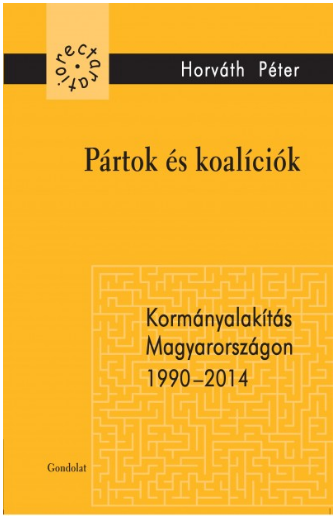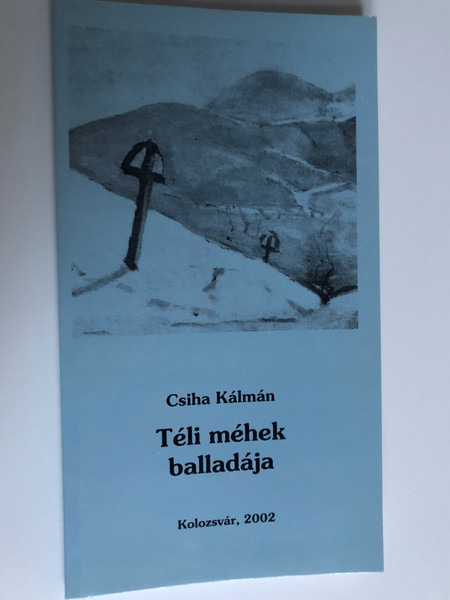Description
Parties and Coalitions – Government Formation in Hungary 1990–2014 / Paperback
Pártok és koalíciók – Kormányalakítás Magyarországon 1990–2014 / Horváth Péter (2014)
Product Information
- Author: Horváth Péter
- Publisher: Gondolat Kiadó Kft.
- Publication Year: 2014
- Place of Publication: Budapest
- Page Count: 298 pages
- Binding Type: Paperback (kartonált)
- Language: Hungarian
- ISBN: 9789636935467 / 978-9636935467
Overview
Pártok és koalíciók – Kormányalakítás Magyarországon 1990–2014 (“Parties and Coalitions – Government Formation in Hungary 1990–2014”) by Horváth Péter is a detailed political science study that examines how Hungarian governments have been formed since the democratic transition. Published by Gondolat Kiadó in 2014, this 298-page book combines empirical research with theoretical insight to analyze the mechanisms of coalition-building, party dynamics, and institutional influences in post-1990 Hungary.
The author challenges widespread political clichés such as “the people voted for this coalition” or “the voters wanted this government,” demonstrating instead that the “will of the people” is often constructed by political elites themselves. Drawing on the latest international coalition theory, Horváth investigates how party programs, ideological distance, and institutional frameworks shape coalition formation—and reveals why these standard models often fail to explain Hungarian cases.
Through both theoretical reflection and historical narrative, the book provides unique insights into the real processes of power negotiation, explaining how leaders such as Boross Péter, Horn Gyula, Gyurcsány Ferenc, and Bajnai Gordon came to power, and how minority and coalition governments were formed between 1990 and 2014.
Hungarian Translation – Áttekintés
A Pártok és koalíciók – Kormányalakítás Magyarországon 1990–2014 című mű Horváth Péter politológus átfogó elemzése a rendszerváltozás utáni magyar kormányalakítási folyamatokról. A Gondolat Kiadó gondozásában megjelent kötet empirikus kutatásokra és nemzetközi koalíciós elméletekre támaszkodva tárja fel, miként alakulnak a magyar kormánykoalíciók, és milyen intézményi, pártpolitikai és ideológiai tényezők befolyásolják létrejöttüket.
A szerző megkérdőjelezi a közéletben gyakran hangoztatott állításokat, mint például: „az ország erre a koalícióra szavazott” vagy „a választók ezt a kormányt akarták.” Elemzése szerint a „népakarat” sokszor a politikusok által konstruált politikai narratíva. A kötet részletesen bemutatja, hogyan választottak új miniszterelnököt ciklus közben, miként jöttek létre a kisebbségi kormányok, és milyen szerepet tölt be az államfő a kormányalakítási folyamatban.
A könyv politológusok, egyetemi hallgatók és érdeklődő olvasók számára is hasznos, akik mélyebben szeretnék megérteni a magyar demokrácia működését és a politikai döntéshozatal dinamikáját.
Product Features
- Subject Area: Political Science, Government Studies, Hungarian Politics
- Time Frame: 1990–2014
- Approach: Empirical and comparative analysis of coalition and government formation
-
Core Topics:
Level: Academic and research-oriented, suitable for advanced political science courses- Mechanisms of coalition-building in parliamentary democracies
- The political role of the President of Hungary
- The gap between voter intention and elite negotiation
- Case studies of major government transitions and prime ministerial appointments
Interesting Facts
- Deconstructing Political Myths: Horváth’s analysis refutes the notion that election outcomes directly determine governments, arguing that politicians, not voters, shape the governing coalitions.
- Innovative Application of Coalition Theory: The book integrates international political science models with Hungarian empirical data, highlighting the limits of standard theories when applied to post-communist contexts.
- Behind-the-Scenes Politics: Reveals the real political maneuvers that led to the appointments of Boross Péter, Horn Gyula, Gyurcsány Ferenc, and Bajnai Gordon, and explains the exceptional formation of the 2009 minority government.
- Early Reflection on 2014 Elections: One of the first scholarly works to include analytical insights on the 2014 Hungarian parliamentary elections.
Hungarian Translation – Érdekes Tények
- Politikai mítoszok lebontása: A szerző rávilágít, hogy a kormányok nem egyszerűen a választói akarat eredményei, hanem a politikusok által formált koalíciós alkuk következményei.
- Koalíciós elméletek újragondolása: A könyv nemzetközi kutatásokat és hazai tapasztalatokat ötvöz, bemutatva, hogy a nyugati koalíciós modellek nem mindig érvényesek a magyar politikai viszonyokra.
- Kulisszatitkok a kormányalakításról: Megismerhetjük, hogyan vált miniszterelnökké Boross Péter, Horn Gyula, Gyurcsány Ferenc és Bajnai Gordon, illetve hogyan jött létre a 2009-es kisebbségi kormány.
- 2014-es választási reflexió: A mű az elsők között kínál tudományos értékelést a 2014-es parlamenti választás tanulságairól.
Publisher
Published by Gondolat Kiadó Kft., Budapest, 2014. All rights reserved.
We value your feedback! Share your experience with this product to help others make informed decisions. Your review is important to us!
Hashtags
-
English: #HorvathPeter #PartiesAndCoalitions #HungarianPolitics #GovernmentFormation #CoalitionTheory #PoliticalScience #GondolatPublisher #Hungary1990to2014 #PoliticalElites #DemocracyStudies
-
Hungarian (Címkék): #HorvathPeter #PartokEsKoaliciok #MagyarPolitika #Kormanyalakitas #KoaliciosElmelet #Politologia #GondolatKiado #MagyarDemokracia #PolitikaiElit #ValasztasiRendszer









